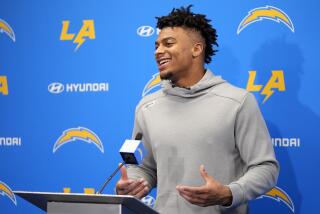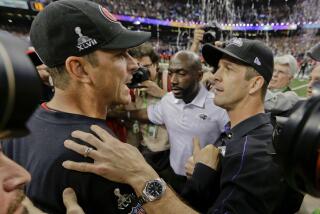BERRY & SON : There Is a Lesson in This Episode of ‘The Kid Knows Best’
- Share via
SAN JOSE — It’s every father’s dream, taking junior into the family business. “Son, someday this will all be yours.” Sweep of the arm. That kind of thing. Yet Bill Berry, whose business is basketball, was reluctant. Ricky could play, would play. No question. But not for Dad.
Father Knows Least is the name of this story. Eventually Ricky did play for Dad, right here at San Jose State. He has played extremely well--twice he has been an All-America honorable mention, certainly he’s one of the best players on the West Coast--and, more importantly, very happily.
“Stupid mistake,” says Coach Berry, whose career and life have been enriched by his son’s better judgment. Then the words that every son hopes someday to hear: “I was a real dummy.”
It was Coach Berry who cast the deciding vote (his was the only such vote in a decidedly undemocratic family decision) that sent his young prospect out of the house and north to Oregon State. Coach Berry, who had been head coach at San Jose State since 1979, had all kinds of reasons for not coaching his son at home.
“Too many pressures,” says Berry, a kindly, warm-hearted man who, with his smile and sweater, does a nice impersonation of Bill Cosby. “Pressures from fans, teammates and even from me. I had read this story about father-sons in basketball where the dad punched his kid in the stomach. Now, it’s an intense game. And I’m an involved coach--I don’t sit the bench real good. I could see myself doing that.”
So, son was packed off to Ralph Miller (who has never been mistaken for the Cos) at Corvallis. Son brooded in the cold northwest. Mom brooded in the near-empty nest. There’s just about no other way to put this: The elder Berry was in a jam.
Ricky, who had had a promising freshman year despite an injury, approached Dad about coming back the next year. “He really wasn’t for it,” he says. “He told me to stay up there and stick it out. I said I’d be better off down here and mom, well, she kind of wanted me to come back. There was a big argument, and he finally kind of gave in.”
Kind of. Kids, don’t try this at home. Parents aren’t too good at recognizing mistakes, horrible at admitting them. But Coach Berry knew he’d made a mistake immediately. “I knew it when he signed,” he says now. “We could have worked it out.”
Whether a father-son situation would work was beside the point, though. In overruling his son, he had denied a high school senior that basic freedom of choice. “I should have given him all the options,” he admits now. “And here I’d just removed his first choice.”
The problem, Berry concedes, “is I imagined all the negatives and didn’t take any positives into consideration at all.”
When you consider that, among the positives, Berry is a 6-foot 8-inch ballhandling forward with moves, a shot and even strength, you must admit that Dad was indeed a dummy. There were probably some coaches who would have slipped Berry something under the table to play for them, and then there’s this San Jose State coach who wouldn’t even let him come to the table.
“I kind of regret that particular period of hallucinating,” Coach Berry says.
The story has taken a happy turn since son was reunited with father. Berry has averaged 18.5 and 20.2 points the past two seasons--winning seasons--and has been averaging 22 so far this senior season. Another good year from this strangely versatile player and San Jose State could finally vault the threshold it yearly finds itself on.
If Dad was a dummy for depriving himself of Ricky for a season, it was at least out of good intentions. Give Dad credit for knowing how good Ricky was. It’s not as if he scouted him out of Oregon State.
“I knew he’d be a good college prospect when he was in the eighth grade,” he says. “Then as he grew, I knew he’d be real good. Then he kept growing . . . “
There has been nobody in either mother’s or father’s family to suggest that Ricky had a potential for such height. Bill, self-proclaimed 6-4 (“More like 6-2,” says Ricky), had been the family’s entire representation of height. Ricky figured to top out at 6-3.
But Ricky kept having these odd growth spurts. “My wife could see them coming on,” the coach says. “His back would hurt and he’d sleep a lot.” Everybody back! Ricky’s about to sprout again! “One month, January, he went from 5-11 to 6-3. Then he’d go dormant until the summer and his feet would grow. He went from a size-12 tennis shoe to 14. I had a couple of 13s stored up, never used them.”
Like corn in the summer, you could just about hear Ricky grow. Ricky hated it because it took his central nervous system time to accommodate the new feet or legs. “I’d look awful bad on the court,” he says.
“It was kind of cute,” Dad says. “He’d stumble and you’d look around and there was nothing there.” Only a dad would think that’s cute.
Aside from depleting the family clothing allowance, these growth spurts served one other important purpose. They allowed Ricky to play every position, gathering skills he’d never have learned if he had been born tall. As a high school freshman he was a guard, as a junior he was a forward, as a senior he was a ballhandling center.
“I’d take the ball up court, pass it off, then get down and post,” says Ricky, describing his modus operandi.
This kind of versatility has made him valuable to more than just San Jose State. Louisville Coach Denny Crum recognized it when he made Berry a starter on his Pan Am team this past summer. “Guard skills and forward size,” Crum has said. “He can penetrate, he can run the floor like a deer, he’s a great outside shooter and he’s a lot stronger than people think he is.”
And he has proven easier to coach than even Coach Berry might have thought. Well, Coach Berry had reason to think he might be a project. Berry avoided being the Little League father but, from time to time, the coach in him would cause him to offer advice. Ricky refused to listen.
“When he was in the seventh grade I told him to run a little more,” says Bill, recalling a fatherly gaffe. “And he said, ‘But Coach wants me to set it up.’ I think he had absorbed this idea of loyalty, picked it up from my coaching talk. He was fiercely loyal to whoever his coach was. The only way I could tell him anything was to tell his mother.”
“Oh, I’d listen to her,” Ricky agrees. An odd family unit?
Finally, though, Bill became Ricky’s coach. “Until I was coach, I knew nothing. Now I’m smart again.”
Of course, Ricky has proven a dream to coach after all. Bill considers all the father-son coaching relationships and finds the generalization that the sons are invariably team-oriented. The lone exception is Pete Maravich, but he was coached to shoot by father Press. “If he had been selfish, he would have been tough to coach,” Bill says. “But he’s a team player. He just wants to win.”
Mostly when Bill talks about Ricky, it is as a father, not a coach. In the coach’s office there are few artifacts of the profession. There is a picture of Michigan State’s 1979 National Collegiate Athletic Assn. championship team (Bill was an assistant coach, Ricky was a ball boy). But mostly there are pictures of family--wife Clarice, daughter Pam and Ricky. Prominent is a wood-carved “No. 1 Dad.” The Cos would blush.
“The one thing I didn’t consider,” says the coach, “besides being a great player, is that he’s fun to be around.” If that’s really true, then he’s a luckier dad than he is coach.
In the meantime, though, he’s a lucky and, finally, smart coach. Ricky used to be known as Bill Berry’s boy. But now Bill is known as Ricky’s dad. And, given the realities of coaching basketball, Bill doesn’t mind the slight. Because, finally, they’re together. And as opponents might well say, playing San Jose State’s boys and Berrys: Preserve us.
More to Read
Get our high school sports newsletter
Prep Rally is devoted to the SoCal high school sports experience, bringing you scores, stories and a behind-the-scenes look at what makes prep sports so popular.
You may occasionally receive promotional content from the Los Angeles Times.






